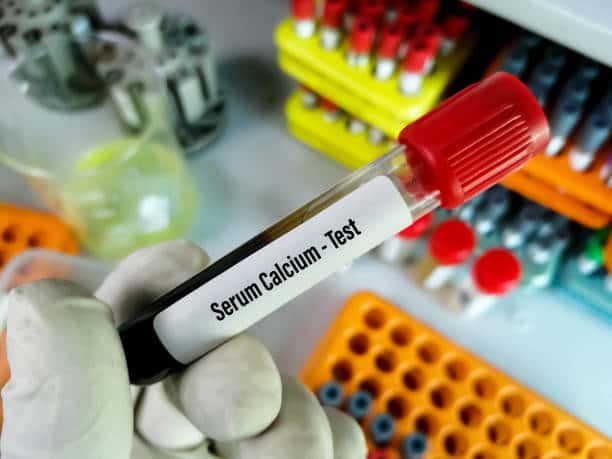
calcium
Calcium is a mineral that's essential for many critical functions in your body. It’s the most abundant mineral in the human body — and about 99% of it is stored in your bones and teeth.
Why is Calcium Important?
Calcium is involved in:
| Function | Why It Matters |
|---|---|
| 🦴 Bone & Teeth Strength | Maintains healthy bones and prevents osteoporosis |
| 💓 Heart Function | Supports normal heartbeat and muscle contractions |
| 🧠 Nerve Signaling | Helps transmit nerve impulses |
| 💪 Muscle Movement | Assists in muscle contraction |
| 🧬 Blood Clotting | Plays a key role in helping blood clot normally |
What is a Calcium Blood Test?
A serum calcium test measures the amount of calcium in your blood, not in your bones. It helps doctors check for:
-
Bone disorders
-
Parathyroid gland issues
-
Kidney disease
-
Certain cancers
-
Calcium imbalance from medications or diet
Normal Calcium Range:
-
Typically: 8.5 to 10.2 mg/dL (may vary slightly by lab)
Abnormal Calcium Levels Can Indicate:
High Calcium (Hypercalcemia):
-
Overactive parathyroid glands
-
Some cancers
-
Too much vitamin D
-
Kidney problems
Low Calcium (Hypocalcemia):
-
Vitamin D deficiency
-
Low parathyroid hormone (PTH)
-
Chronic kidney disease
-
Malnutrition
About The Package
Calcium is a mineral that's essential for many critical functions in your body. It’s the most abundant mineral in the human body — and about 99% of it is stored in your bones and teeth.
Why is Calcium Important?
Calcium is involved in:
| Function | Why It Matters |
|---|---|
| 🦴 Bone & Teeth Strength | Maintains healthy bones and prevents osteoporosis |
| 💓 Heart Function | Supports normal heartbeat and muscle contractions |
| 🧠 Nerve Signaling | Helps transmit nerve impulses |
| 💪 Muscle Movement | Assists in muscle contraction |
| 🧬 Blood Clotting | Plays a key role in helping blood clot normally |
What is a Calcium Blood Test?
A serum calcium test measures the amount of calcium in your blood, not in your bones. It helps doctors check for:
-
Bone disorders
-
Parathyroid gland issues
-
Kidney disease
-
Certain cancers
-
Calcium imbalance from medications or diet
Normal Calcium Range:
-
Typically: 8.5 to 10.2 mg/dL (may vary slightly by lab)
Abnormal Calcium Levels Can Indicate:
High Calcium (Hypercalcemia):
-
Overactive parathyroid glands
-
Some cancers
-
Too much vitamin D
-
Kidney problems
Low Calcium (Hypocalcemia):
-
Vitamin D deficiency
-
Low parathyroid hormone (PTH)
-
Chronic kidney disease
-
Malnutrition
Inclusions & Exclusions
Inclusions
Blood Sample Collection
-
A small sample is taken from a vein (usually from your arm)
-
Sometimes done with other blood tests
Serum Calcium Measurement
-
Measures total calcium in your blood
-
Includes both:
-
Free (ionized) calcium – active form
-
Bound calcium – attached to proteins like albumin
-
Standard Lab Report
-
Includes:
-
Your calcium value (in mg/dL)
-
Normal reference range
-
Flag if results are high or low
-
Optional Add-On (if ordered by doctor):
-
Some labs may also include:
-
Ionized calcium (active form)
-
Albumin level (used to adjust total calcium)
-
These are typically part of more detailed or adjusted tests
-
Exclusions
1. Ionized (Free) Calcium
-
The active form of calcium in the blood
-
Not measured unless specifically requested as an ionized calcium test
2. Calcium in Bones
-
It does not show how much calcium is in your bones
-
For bone health, you need a DEXA scan (bone density test)
3. Vitamin D Levels
-
No information about Vitamin D, which is essential for calcium absorption
4. Parathyroid Hormone (PTH)
-
Does not test for PTH, which controls calcium balance in the body
5. Magnesium and Phosphate
-
These minerals also affect calcium levels but are not included in the basic test
6. Kidney or Liver Function
-
No results on how well your kidneys or liver are working (even though they can affect calcium levels)
7. Medical Diagnosis or Consultation
-
The test gives a number but does not include a doctor’s consultation, diagnosis, or treatment plan
About The Treatment
A Health Check-Up is a preventive medical examination designed to assess your overall health status and detect early signs of diseases or risk factors. These check-ups typically include a series of physical examinations, laboratory tests, and diagnostic screenings tailored to age, gender, medical history, and lifestyle.
Routine health check-ups are essential for early detection of conditions such as diabetes, heart disease, hypertension, and cancer. They help doctors monitor critical indicators like blood pressure, cholesterol levels, organ function, and more. Depending on the package or provider, a health check-up can range from basic blood tests to advanced imaging like CT scans or full-body MRIs.
